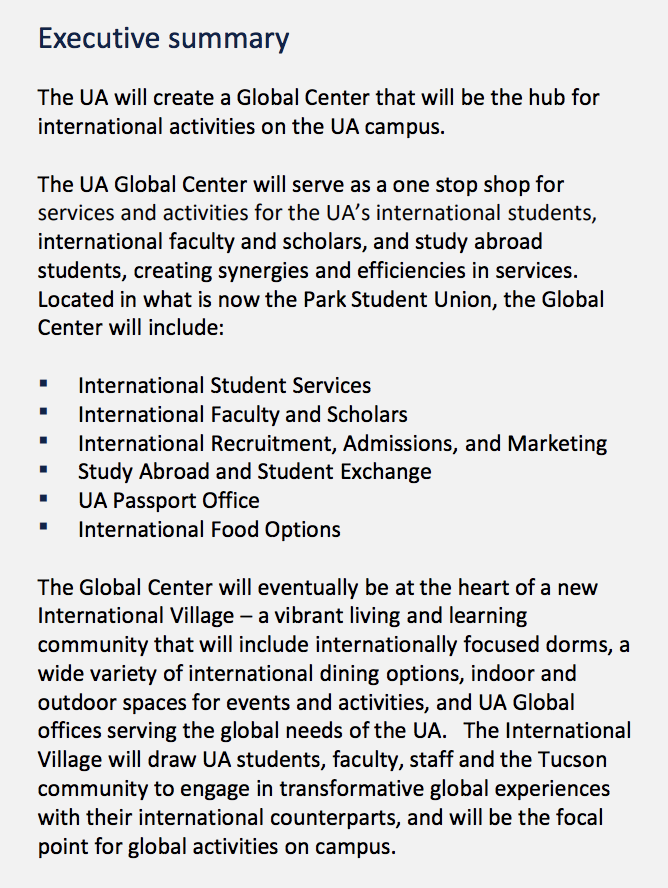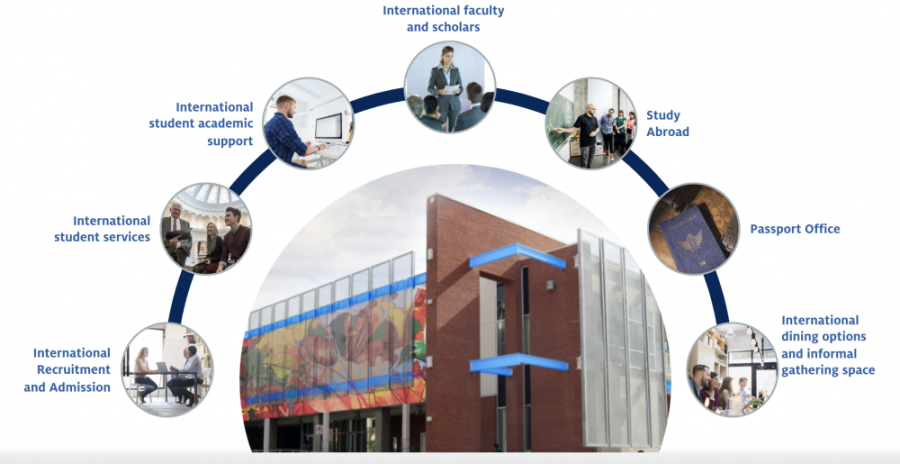The University of Arizona’s Strategic Plan outlines many changes, some of which have already been set in motion. One such project is the development of a UA Global Center in the current Park Student Union building, which will house many of the services UA Global provides.
UA Global is a department on campus that coordinates various services related to international study, whether for students and faculty coming into the U.S. or leaving. Under the Strategic Plan, UA Global is a central focus, as pillar four of the plan is devoted to its presence.
The new UA Global Center will increase UA’s “global draw” by creating a centralized, easy-to-navigate and welcoming space, according to Brent White, vice provost for Global Affairs.
“The UA Global Center will be designed to act as a hub for international activities and global engagement at the UA,” White said. “So part of that is serving as a one-stop shop for services and activities for our international students and our international faculty and scholars and our study abroad students.”
RELATED: UA unveils new, far-reaching Strategic Plan
Currently, White said international and global services are located all around campus, making them harder to access.
“Right now, international is so spread out. There’s no one place you can go if you’re interested in talking to global,” White said. “So that’s the kind of services that will be provided in the Global Center.”
The new center will house International Student Services, International Faculty and Scholars, UA Study Abroad, UA Passports and International Recruitment, Admissions, and Marketing. According to White, moving UA Study Abroad to a more visible location is an important focus of the new project, as its current position in the University Services Building makes it hard to access.
“It’s out of the way, so students don’t see it. We want to have the study abroad office more accessible to all students and have the storefront so that students can see the great opportunities we have for study abroad,” White said.

The UA Global Center will also have international food options in the form of restaurants serving authentic food from five countries and a grocery store, White said, and the lounge spaces will be upgraded and expanded. The current Office of Student Computing Resources lab will be upgraded, as will the Think Tank. Multipurpose study and meetings rooms will also be created.
While ThinkTank and the OCSR Lab will stay, several other services will be moved elsewhere on campus, including Arizona Student Media and the Tucson Festival of Books office. White said he and his team are currently in the process of finding equitable space on campus for those services to move into.
“Our number one goal right now is to find the space that’s suitable, space that’s equitable and fair, and then once we find that then we can move on with the project, but that’s, for us, step one: making sure that there’s a good place for everyone,” White said.
White said the consultations with each service are ongoing.
“I do believe that in some cases, and I hope in all cases, it will be better for those that move,” White said. “I believe that there’s usually a win-win when people sit down with an open mind.”
Olivia Jackson, general manager of UATV and a senior studying journalism, said on the student end, they have not yet been asked to sit down and talk.
“When it comes to how the school sees you, you hope that they see you as a respectable establishment, that you do good work and that you deserve to be shown the respect that you’ve earned over the last years you’ve been working. And they didn’t do that with us,” Jackson said. “I would have loved it, when the talks were first happening … if the three leaders of student media had been brought into the conversation, brought to the table, so that way we could sit down and talk. But they haven’t even reached out to us.”
RELATED: Construction underway for new Student Success District
While Jackson said the director of Arizona Student Media, Brett Fera, had been involved in talks with UA Global and other university stakeholders, but there has not yet been a resolution.
“Honestly, it feels a little bit like we’re in the dark,” Jackson said. “Not much has been told to us … We’re in a limbo right now. I don’t know where we’re moving. I don’t know when.”
Jackson said she was concerned about losing easy access to the recording studio UATV uses, as well as being further from the School of Journalism, which is located in the Marshall Building on 845 N. Park Ave.
“A huge negative is how abrupt it was, how they just didn’t really take into consideration that we’ve all formed a family here,” Jackson said. “I’ve been in this office since I came here.”
However, Jackson said it’s not really the move that’s the core problem.
“If they want to move us, okay, that’s fine. It’s a business, people have to move,” Jackson said. “It’s more the family, not the location. But at least give us the common decency to let us talk with you.”
As far as the timeline of the project, White said he hopes to have phase one of the project done by the end of Fall 2019 which would include moving services in like International Student Services, International Faculty and Scholars, International Admissions, Study Abroad, UA Passports and global travel services, as well as upgrading the study and lounge spaces. To avoid disrupting the academic year, White said phase two, which includes the food court and outdoor courtyard of Park Student Union, would not be started until the summer of 2020.
“The Park Student Union has been in need of an upgrade for a very long time, so this is an opportunity to make that space more attractive and useful for the whole university,” White said.
Right now, as the project is still in the design phase, White said he didn’t have a final dollar amount for the renovations, but estimated the initial cost to be about one million dollars.
“There are additional funds beyond that, depending on what we discover and what the needs are,” White said. “It’s an old building.”
According to White, the funds for the upgrades comes from the Strategic Plan budget. A news release emailed on March 22 shared UA’s proposed tuition increases for the 2019-2020 academic year, which are intended to provide financial support for the Strategic Plan.
“The increase is needed to fund priority initiatives under the university’s new strategic plan and increases in external costs,” the news release said.
The proposed increases in tuition are 2 percent for all incoming resident undergraduate students and 1 percent for incoming nonresident undergraduate students. For graduate resident students, the proposed increase is 1.89 percent at the Tucson campus and 1.59 percent at the UA South campus, while there is no proposed change for nonresident graduate students.
In the news release, the total tuition and fee costs were listed as $12,671 per year for incoming resident undergraduates, $36,698 per year for incoming nonresident undergraduates, $13,207 per year for incoming resident graduate students on the main campus and $33,334 per year for incoming nonresident graduate students on the main campus.
RELATED: Tuition increase for incoming freshman outlined in new proposal
Jane Hunter, who is leading the implementation of the Strategic Plan, said overall, the focus of the Strategic Plan is to help students and making study abroad available to more students was one of the most important initiatives.
“We have identified a number of initiatives that will receive some special funding in order for those initiatives to move forward, and very many of those are really focused on students and student success,” Hunter said. “That really rose to the top of the priorities.”
Follow Marissa Heffernan on Twitter








